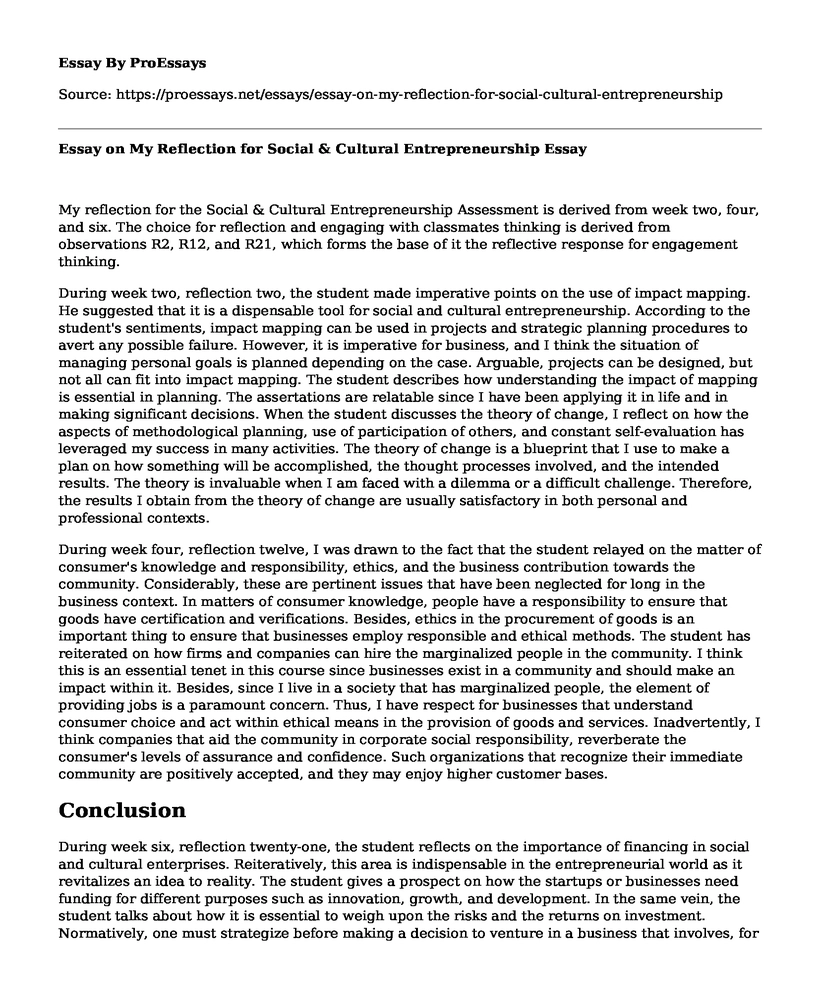My reflection for the Social & Cultural Entrepreneurship Assessment is derived from week two, four, and six. The choice for reflection and engaging with classmates thinking is derived from observations R2, R12, and R21, which forms the base of it the reflective response for engagement thinking.
During week two, reflection two, the student made imperative points on the use of impact mapping. He suggested that it is a dispensable tool for social and cultural entrepreneurship. According to the student's sentiments, impact mapping can be used in projects and strategic planning procedures to avert any possible failure. However, it is imperative for business, and I think the situation of managing personal goals is planned depending on the case. Arguable, projects can be designed, but not all can fit into impact mapping. The student describes how understanding the impact of mapping is essential in planning. The assertations are relatable since I have been applying it in life and in making significant decisions. When the student discusses the theory of change, I reflect on how the aspects of methodological planning, use of participation of others, and constant self-evaluation has leveraged my success in many activities. The theory of change is a blueprint that I use to make a plan on how something will be accomplished, the thought processes involved, and the intended results. The theory is invaluable when I am faced with a dilemma or a difficult challenge. Therefore, the results I obtain from the theory of change are usually satisfactory in both personal and professional contexts.
During week four, reflection twelve, I was drawn to the fact that the student relayed on the matter of consumer's knowledge and responsibility, ethics, and the business contribution towards the community. Considerably, these are pertinent issues that have been neglected for long in the business context. In matters of consumer knowledge, people have a responsibility to ensure that goods have certification and verifications. Besides, ethics in the procurement of goods is an important thing to ensure that businesses employ responsible and ethical methods. The student has reiterated on how firms and companies can hire the marginalized people in the community. I think this is an essential tenet in this course since businesses exist in a community and should make an impact within it. Besides, since I live in a society that has marginalized people, the element of providing jobs is a paramount concern. Thus, I have respect for businesses that understand consumer choice and act within ethical means in the provision of goods and services. Inadvertently, I think companies that aid the community in corporate social responsibility, reverberate the consumer's levels of assurance and confidence. Such organizations that recognize their immediate community are positively accepted, and they may enjoy higher customer bases.
Conclusion
During week six, reflection twenty-one, the student reflects on the importance of financing in social and cultural enterprises. Reiteratively, this area is indispensable in the entrepreneurial world as it revitalizes an idea to reality. The student gives a prospect on how the startups or businesses need funding for different purposes such as innovation, growth, and development. In the same vein, the student talks about how it is essential to weigh upon the risks and the returns on investment. Normatively, one must strategize before making a decision to venture in a business that involves, for example, risk analysis, funding and possible returns on investments. Thinking about the issues addressed in this reflection, I deflect back to the times I have thought of a business venture and the manner I was approaching it. I believe it is a part that implores funding, risks analysis, and shared vision and goals. Therefore, weighing back to the teaching of week 12 as well as looking at the case studies of a successful and failed business, I contend that one must look at the financial funding, the impact, and the investment involvement. Besides, it is significant that individuals should align their goals with their mission statement as determinants for business viability.
Cite this page
Essay on My Reflection for Social & Cultural Entrepreneurship. (2023, Jun 06). Retrieved from https://proessays.net/essays/essay-on-my-reflection-for-social-cultural-entrepreneurship
If you are the original author of this essay and no longer wish to have it published on the ProEssays website, please click below to request its removal:
- Essay Sample on Principles of Food and Beverage Service Management Changes
- Cultural History and Values Paper Example
- Essay Sample on Adoption in the LGBT Community
- Essay Exaample on Rhetorical Theory: Understanding Symbols in Communication
- Low Wages: Parental Struggles and Inequality Risks - Essay Sample
- Essay Example on Business Ethics: A Guide to Creating a Positive Workplace Environment
- Essay Example on Gambling Addiction: Long-Lasting Consequences on Society







